
The relationship between Salvador Allende and Augusto Pinochet
Chile´s most influential figures in the 20th century
How General Augusto Pinochet´s spent his last day on earth would be the best way to describe his whole life , one full of controversy and conflict. After being officially pronounced dead at 2:15 p.m. on Sunday December 10, Pinochet´s body was taken to the Military Academy in Santiago, where it was displayed in a coffin surrounded by a guard of honor formed by Army cadets. From that moment on thousands of his supporters gathered outside the building and were allowed to line up and walk past the coffin to pay their last respects, and the procession continued until the next day. Official estimates are that at least 60,000 people walked by Pinochet´s coffin. The funeral ceremony was carried out on Dec. 11, but President Michelle Bachelet only allowed a funeral as Head of the Armed Forces. According to an opinion poll carried out by " La Tercera", one of Chile´s most influential newspapers, 72% of those questioned were against calling for a national mourning period and 55% were against giving Pinochet a State Funeral.

Many foreign journalists had gathered to cover the event outside the Academy and were attacked and insulted by Pinochet´s supporters, as were many local reporters. Maria Jose Ramudo, a journalist with a Spanish TV station was carrying out a live transmission to her country when objects were thrown at her. A man identified as Rene Araya took the microphone away from her and shouted high caliber insults against Spaniards.
On Dec.14, Araya gave a press conference at the Chilean Journalists Association where he publicly apologized to Spain and the Spanish people for his behavior. Also an Argentine journalist that was broadcasting to his country, mentioned that "Pinochet, the Chilean dictator is being mourned in this building" and was physically and verbally attacked by Pinochet supporters. Most Pinochet supporters blamed the press for all of Pinochet´s legal problems. During the funeral ceremony, Pinochet´s grandson, an Army captain also named Augusto, gave an improvised speech where he praised his grandfather for "saving Chile from the Marxist regime" and criticized the Chilean Supreme court for "harassing his grandfather and his family". The next day Captain Augusto Pinochet was expelled from the Chilean army. After the speeches and a brief march in a horse drawn carriage, Pinochet´s body was taken aboard a helicopter and flown to a cemetery in Vina del Mar, 130 kilometers to the west of Santiago, where Pinochet was cremated and his ashes were handed to the family. The destinies of Allende and Pinochet were linked from the beginning, since by a strange twist of fate, both were born in Valparaiso, Chile´s main seaport . Allende (born in 1908) was the son of a lawyer that also had the privilege of being a "Notary Public", a much-coveted position in Chile due to its high income. Pinochet (1915) was the son of a Port Customs inspector and as a child was educated in Roman Catholic schools.
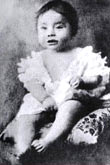
After ending secondary education, Pinochet applied for entry to the "Military Academy" in Santiago, where he was finally admitted after a third attempt in 1933.
In the same year as Pinochet began instruction at the "Military Academy", Salvador Allende had graduated from the faculty of medicine at the "University of Chile", the country's most prestigious establishment of higher education. By this time Allende was also a high ranking member of the "Freemason Society" a very influential organization in Chilean society, while Pinochet was rejected entry into the Freemasons.
While Allende was heading for a successful and glamorous political career in the Chilean congress, Pinochet was stationed in different points of the country as an Army officer, in charge of provincial regiments far from the capital. However, in 1943, Pinochet took a step that changed his fortune since he married Lucia Hiriart, the daughter of an influential politician, that convinced her father to exert his influence and obtain better postings for her husband.
In 1945 Allende is elected "Senator" and also becomes the leader of Chile´s left wing coalition of parties. During the middle of the 1950´s , the Chilean government, following the example of Senator MacCarthy in the United States, outlaws the Communist Party and many of its members are sent to prison camps, one of which is headed by Augusto Pinochet . In 1961 Salvador Allende meets for the first time with Ernesto "Che" Guevara , while Pinochet travels to "The School of the Americas" in Panama, a training center run by the U.S Army where Latin American officers are trained in counter insurgency methods. Pinochet specializes in "Intelligence Operations" and many of his classmates will also become the rulers their respective countries during the 1970s.
In September, 1970 during his third presidential campaign, Allende is the highest voted candidate with 36.6% and according to Chilean law is the winner of the election. Initially Allende wanted to maintain good relations with both the Western and Eastern Blocks, but his decision in July 1971 to nationalize the local copper mines, ( the world's largest deposits), earned him the wrath of the Richard Nixon administration since the majority of the mines were owned by U.S. companies. Immediately Nixon blocked all financial credits to Chile and ordered covert operations aimed at collapsing the Allende government. At this point the Allende government strengthened its ties with Soviet block and the conflict intensified. Meanwhile Augusto Pinochet had reached the highest ranks of the Army and apparently had won the confidence of Allende that appointed him Commander in Chief of the Armed forces on August 25, 1973. Until then Pinochet had given the impression of being loyal to Allende, but in fact he was a master of deception that had already began to plot the military intervention that reached its climax on September 11, 1973.
Salvador Allende died that day in the presidential palace without knowing that Pinochet was heading the armed "Coup d' Etat". Such was the conspirational skill of Pinochet that only a few high ranking officers such as the head of the Navy and Air Force knew that he was part of the plot.
During his first days in power, Pinochet was appointed head of the military "Junta" (group of leaders) and promised that new presidential elections would be held as soon as possible. However, his behavior arose suspicions when Pinochet set up a new organization called "National Directorate of Intelligence " (DINA in the Spanish acronym). One of the first intelligence reports by the U.S. Department of Defense stated that "many senior Chilean military officers regard that DINA may become a modern day Gestapo". Pinochet appointed Coronel Manuel Contreras as head of DINA, that would become his right hand man and with whom he would meet every morning to give instructions. In December 1974, Pinochet appoints himself "President of Chile" and "Supreme Leader of the Nation". The first years of the Pinochet regime were marked by the repression of the left wing parties such as the Socialist Party, Communist Party and the MIR, a guerrilla organization. Under Pinochet , Chile became one of the first countries to introduce "Neo-Liberal" economic reforms based on the theory of Milton Friedmann, a professor at the University of Chicago. As a result, unemployment increased dramatically and hundreds of thousands were forced to emigrate.
Meanwhile DINA continued with its actions within and outside Chile, and its agents were the first foreigners to carry out a terrorist attack in U.S territory. In 1976 , Orlando Letelier, the leader of the opposition was killed by a car bomb in in Washington D.C. Along with Letelier died Ronnie Moffit, an American citizen. Many years later when Manuel Contreras was arrested, he testified that "C.I.A" agents had carried out the assassination.
In 1980 Pinochet created a new Constitution for Chile and prolonged his term in office for another eight years, a decision that caused massive streets protests , labor strikes and armed guerrilla operations, such as the 1986 ambush that nearly cost Pinochet his life. Finally in 1988 Pinochet was forced to call for a plebiscite, with two options: Pinochet would continue until 1997 "SI" (yes option) or "NO" (an end to his government). The "NO" option came out on top with 55% of the votes and Pinochet called for free elections in 1989. Pinochet continued as Commander in Chief of the Chilean Armed Forces until 1998, when he became an "Institutional Senator", and also a sort of commission agent for the Chilean Armed Forces, sealing arms deals in other countries. In one such trip Pinochet traveled in October 1998 to London , where he had to undergo an emergency surgery. On October 16, while recovering at the "London Clinic" , Pinochet was arrested by the British police. A Spanish judge, Baltasar Garzon had requested Pinochet´s extradition to be questioned about the whereabouts of some 100 Chilean-Spanish citizens. The French, German, Italian, Swedish and Belgian courts presented similar extradition warrants against Pinochet. After 503 days of house arrest in London, the British and Chilean governments made a secret agreement to return Pinochet back to Chile due to his "poor health". After arriving in Chile, Pinochet was faced with more than 300 legal accusations of murder, torture and kidnapping. For example, Pinochet was accused of trying to cover up the illegal detention and death of 119 left wing militants. A single edition of a newspaper was published in Brazil, where the names of the 119 Chilean citizens appeared and a story claimed that they had been killed in an "internal feud".
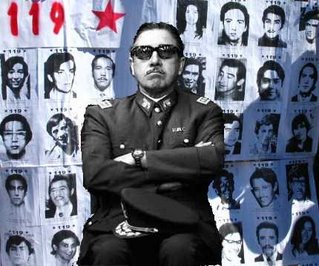
Pinochet had good contacts in the Chilean Supreme Court, and so many judges aided him by slowing down the legal accusations and putting obstacles into the investigation of the cases, but even so, Pinochet was put under house arrest on several occasions. Another scandal occurred in 2005, as during the course of an internal investigation by U.S authorities, nearly US$30 million appeared in secret bank accounts linked to Pinochet. The U.S. authorities were implementing the "Patriot Act" that was aimed at discovering possible accounts used by terrorists to finance their activities. While Allende was never accused of any acts of corruption, Pinochet´s family will inherit the legal accusations faced by Pinochet. Already many politicians are requesting that Pïnochet´s fortune be confiscated by the Chilean state.
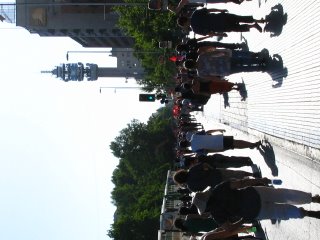
Chileans Celebrate Pinochet's Death
Rally on news of dictator's death at 91 turns violent
Santiago: Chile, Sunday, December 10, 2.35 p.m. local time
I was getting ready to indulge in what has become my favorite pastime this year, watching English Premier League on television. The match between Chelsea and Arsenal had just begun when I was rudely interrupted by a newsflash. The commentator said that the Military Hospital had announced that General Augusto Pinochet had died at 2:15 p.m. local time from heart complications.
My initial reaction was to get on my feet and cheer, but then I thought, "What if he is faking it again?" After all, Pinochet had been said to have been "dying" several times before. On TV I saw that people were gathering at "Plaza Italia," a central meeting point in the city where citizens gather to celebrate sporting victories or other important events. Meanwhile, the television showed the outside of the Military Hospital, where some Pinochet supporters were in tears.
A sudden rush of excitement took hold of me and I picked up my digital camera and headed off to the Plaza Italia. It was 4 p.m. when I arrived by bus (time was going fast). I saw people in cars blasting their horns towards Plaza Italia. When I got there, thousands of people were already celebrating, most of them left wingers with their traditional red flags.
Some fifteen minutes later I was outside La Moneda where some thousands of people had gathered. The riot police had formed a barrier to stop people from going near the palace. Some of the leaders of the left-wing parties were allowed to go to the palace; probably they went to ask for permission to march past it. This idea came too late as the heat and excitement made some of the marchers begin throwing missiles at the police, and obviously violence erupted. The police's water cannon vehicles got into action, but this only provoked the protesters even more, who began to set up barricades with whatever they could find. Later the police attacked with tear gas vehicles, which managed to disperse the crowd outside the Palace after about an hour of clashes.

The tear gas had hit me hard. I could not continue taking more photos, and after drinking my third can of beer, I headed out of the "combat zone". My impression is that today the majority of the Chilean people showed their anger against Pinochet and did indeed celebrate -- some more energetically than others.
It seems that Pinochet has some numerological connection with the number "11," He took part in the military coup in 1973 on Sept. 11 (which he did not organize and only joined at the last minute), and now his funeral will be on Dec. 11. There was a controversy over whether he will get a funeral as a former "head of state," but President Michelle Bachelet announced that there will be no such ceremony. Bachelet's father was a pro-Allende Air Force general who was tortured to death in prison some months after the coup.
Pinochet was appointed head of the Armed Forces by President Allende only fifteen days before Sept. 11, 1973, when the military took power. General Pinochet initially was the head of a military junta (a Spanish word that means gathering or group) formed by the head of the army, navy, air force and police.
From that date on he was the head of an undercover operation along with the military rulers of Argentina, Paraguay, and Uruguay, whose objective was to wipe out left-wing militants. "Operation Condor" led to the death of approximately 40,000 people in these countries, the most common method being the kidnapping of individuals who were then tortured to obtain information, and finally killed. Most of the left-wing militants' bodies were thrown into the sea from helicopters. After several years of street protests and guerrilla operations, Pinochet was forced to call for elections in 1988, which he lost, giving way for the 16-year rule of a center-left wing coalition of parties known as "Concertacion."
My personal opinion is that Chile will be much more peaceful after Pinochet's death. The curse is over, let's try to turn over the page and move forward together.

MAPUCHES DECLARE WAR ON MICROSOFT CORPORATION
Bill Gates sparks anger among Chilean natives
During an interview given by Aucan Huilcaman to AtinaChile (www.atinachile.cl) on August 12, 2005, the leader of the Mapuche nation denounced that he would sue Microsoft Corporation on behalf of his people since the software company planned to release a version of its “Windows XP” operating system in “Mapundungun” (the native language) without their authorization.
“We sent a letter to Bill Gates expressing our concern about this situation since we believe it is an act of intellectual piracy.We are the natural heirs of the Mapuche language and it is up to us to decide what we do with it. The Chilean government and Microsoft did not ask for our opinion on how to implement the Windows version, they just went ahead and did it,” said Huilcaman to Atinachile.
The elders of the Mapuche Nation carried out a ceremony called “Kimkeche Nutramkan” (gathering of Wise Men and Custodians of the Mapuche Culture) after which they agreed on sending the letter to Bill Gates that included the following paragraphs : “Mapundungun is a fundamental part of our culture and it is our right as an indigenous nation to preserve and develop our cultural heritage............Your decision to implement Windows in Mapundungun may be a good contribution to its technical-linguistic development, but the way it has been done has shown a total disrespect and lack of consultation with the Mapuche Nation.”
Since there was no reply from Bill Gates, Aucan Huilcaman presented several legal actions among others at the Interamerican Commission for Human Rights in Washington D.C and also in the Chilean Courts of Justice.
“I am not against Internet, I am only defending our Nation’s rights and culture, it is the speakers of Mapundungun that should decide whether our language is used in the Web or not.” said Huilcaman to Atinachile.
On Nov 23,2006 the Appeals Court in the city of Temuco, the heartland of the Mapuche territory, declared the “Protection Order” admisible and so the judges will study the case against Microsoft Windows XP and the Chilean Ministry of Education, that signed an agreement in October 2006 to launch the operating system in the Mapuche language.
The Mapuche are a native ethnic group that inhabit the south of Chile and Argentina. It is estimated that nearly 400,000 people speak Mapundungun at present. The Mapuches are an extremely warlike people that first resisted domination by the Inca empire and later by the Spaniards. During the past 5 years there have been many armed clashes between Mapuches and Chilean police over ownership of large areas of land claimed by the natives.
href="http://photos1.blogger.com/blogger/6198/4047/1600/overtraffic2.jpg">
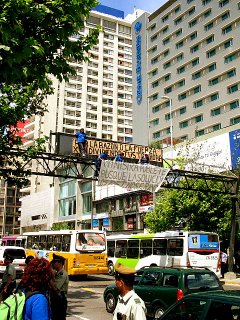
Chilean Women Defy Gravity To Get Better Housing
Housewives Climb On Top Of Traffic Signpost to protest
On Friday, Nov 3, a group of eight women that are members of Chile´s "National Association of Housing Debtors" (ANDHA in the Spanish acronym) carried out a spectacular protest in downtown Santiago, the Chilean capital. At approximately midday, the women climbed on top of a traffic signpost directly over the city's main avenue, the Alameda. The women declared to the reporters that gathered to cover the event that they would remain there until the Minister of Housing Patricia Poblete stopped a court order whereby their low income houses would be auctioned due to unpaid installments. Most of the women were also taking part in a temporary employment scheme for poor families called P.E.T that included sweeping streets, collecting litter and mowing lawns. ANDHA argues that their members will be unable to pay the monthly installments since these are far too high, the houses are of poor quality and also the majority were taking part in the P.E.T ., and since this plan was terminated a few months ago, the women are now without any stable sources of income.
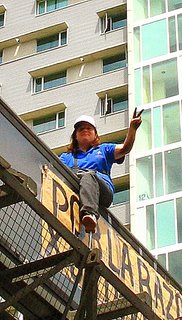
The group that climbed on top of the signpost were supported from the street by a group of nearly a hundred people that chanted slogans and insults against Minister Poblete, the police and the government. This is not the first time that ANDHA carries out this kind of actions, and the last time some of the women ended up jumping from a signpost towards a plastic landing bag set up by the police. At approximately 7:30 p.m. the police blocked the traffic with two buses, one water cannon truck and several patrol cars.

Some members of ANDHA on the street were arrested and then police officers used ladders to climb up to the signpost. A yellow landing bag was placed under the signpost and the officers forced the women to climb down. The whole operation lasted 45 minutes and none of the protesters were injured, but had to spend the night in detention. On Saturday night, members of ANDHA set up barricades near their homes with burning tires and clashed with the Police yet again















No comments:
Post a Comment